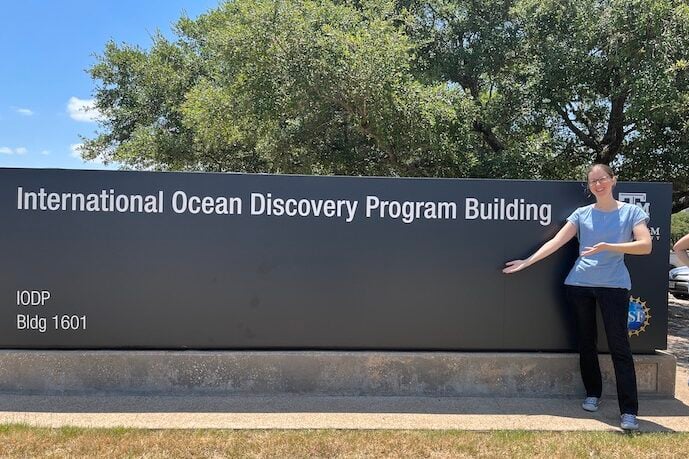To learn more about our planet, scientists must travel to remote and extreme places to gather information. These field trips are necessary to answer new scientific questions and better understand our world.
From December 2023 to February 2024, I will take part in one of those trips. As a science team member on a ship called the JOIDES Resolution (JR), I will be participating in what is known as Expedition 401, where we will take cores of the Mediterranean Sea floor by drilling deep down into the ocean floor. It’s very similar to ice coring where scientists pull deep tubes of ice out of glaciers to study particles from thousands of years ago saved in the water. In the ocean, the tubes are instead full of rock with clues to our geological history.
These large cylinders of rock help us learn about some crazy times in Earth’s history. They provide knowledge that could help us better understand the climate of our planet. Expedition 401’s mission is to look at the interactions between the waters of the Atlantic Ocean and the Mediterranean Sea, as well as learn about a strange time in the Mediterranean’s history when it largely dried up, leaving behind a huge amount of salt.
To do this, though, we must be out at sea for two solid months. Time is precious on expeditions like this one, so we cannot go to shore to restock supplies.

What does it take to prepare for a scientific expedition like this? A lot of work from hundreds of people. I underwent training at Texas A&M University to learn more about the ship, life at sea, and my role while on board. I will serve as an on-board outreach officer during the expedition, managing ship-to-shore calls with schools and museums, running the ship’s website and social media, and working on my own personal outreach project. All of that requires advanced planning.
The focus of the trip is science, so there will also be around 30 scientists on board with different goals. They all prepared their research plans regarding how they are going to work with the samples brought up from the ocean floor.
There are a lot of individual science goals, so almost the entire team traveled to the UK to meet up before we head out to sea together. Here we learned what each of us is an expert in and how we can support each other during our 2 months in the Mediterranean.
But of course, preparations need to be made just to be able to live at sea for 2 months. I had to go through an extensive medical check to submit to the program. I must be given the thumbs up that I am fit to spend 2 months at sea with little access to medical care.
Additionally, there are large groups of people planning the meals, laundry services, and supplies for the whole journey. For example, a previous expedition brought 18,000 eggs, 3,000 pounds of flour, and 17,000 pounds of meat and fish to feed the crew for their 2-month expedition. We will probably require a similar amount of supplies. It takes a lot of planning to figure out 2-months’ worth of meals, especially when you are traveling during the holidays.
With all that work done, the plan is to start our journey on December 10 from Amsterdam in the Netherlands. We will wrap up in February in Italy.
Want to follow along on my journey on Expedition 401? Ask your parent’s permission to follow along on the JOIDES Resolution’s social media channels:
Instagram: @joides_resolution
Facebook: JOIDES Resolution
Twitter: @TheJR
You can also follow me @erinwinick on all social platforms. And I will be sure to report back to Beanz when I return about how the expedition went!
See you in a few months.
Learn More
Joides Resolution
Core Preparation and Analysis Laboratory
https://www.usgs.gov/labs/core-preparation-and-analysis-laboratory-and-sample-repositories
Explore Rocks Using Core Sampling
https://www.jpl.nasa.gov/edu/learn/project/explore-rocks-using-core-sampling/
Sea Floor Sampling
https://noc.ac.uk/facilities/national-marine-equipment-pool/scientific-engineering/seafloor-sampling
Black Sea Core Sampling
https://www.youtube.com/watch?v=sCAvoR-w83U
Ocean Floor Sampling
https://www.youtube.com/watch?v=ms5PwLNW2Ms
Deepest Sediment Core Collected
https://www.whoi.edu/press-room/news-release/deepest-sediment-core-collected-in-the-atlantic-ocean/
The Challenger Expedition
https://divediscover.whoi.edu/history-of-oceanography/the-challenger-expedition/

